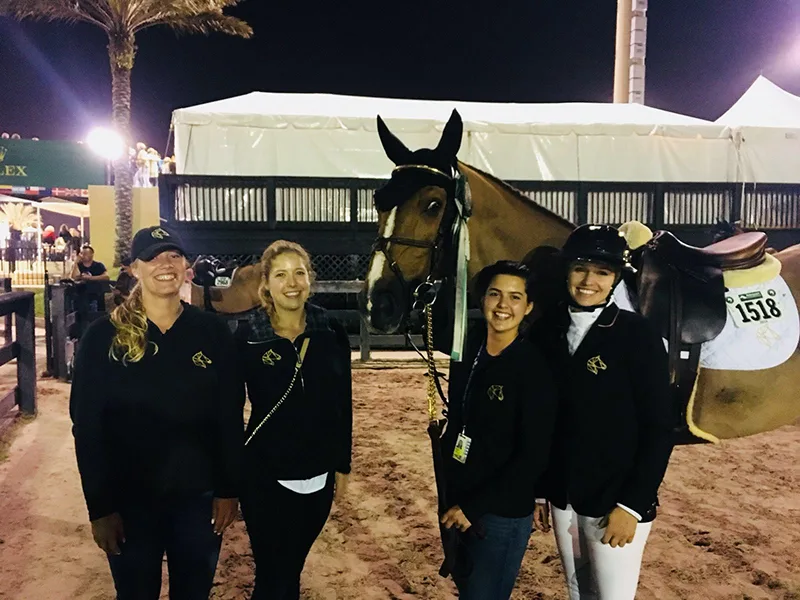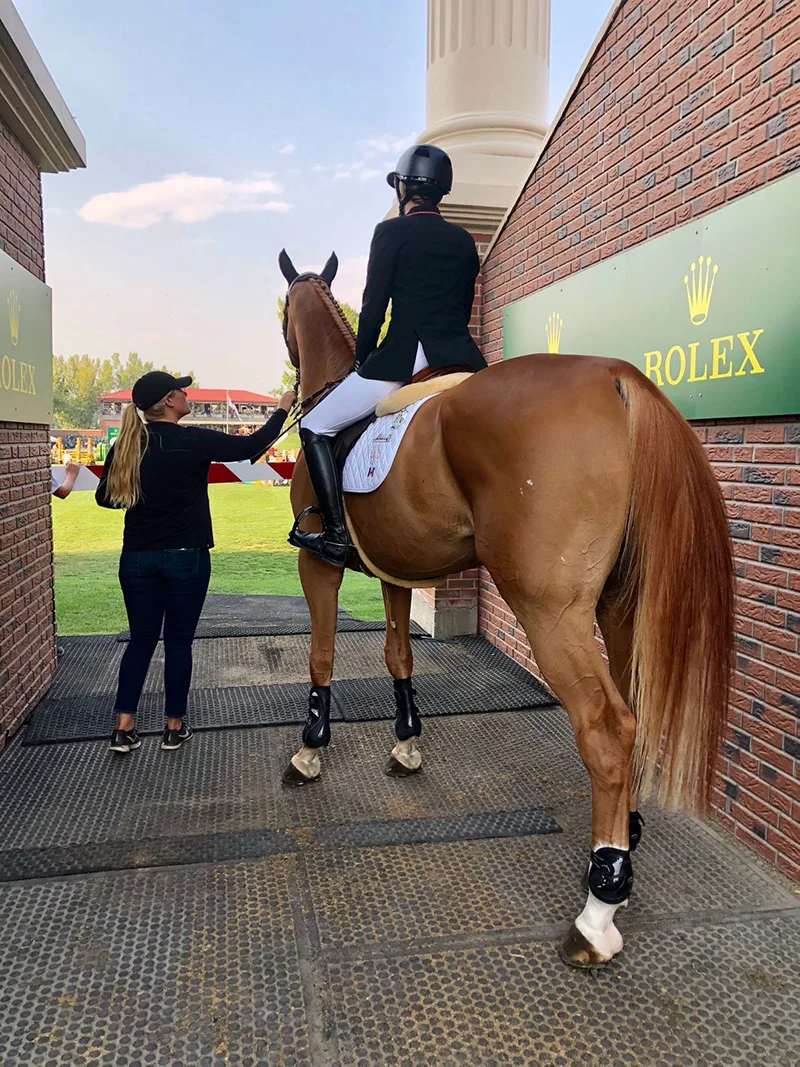In 2017, Louise Persson left her grooming days behind and became the barn manager at Canadian Olympian Tiffany Foster’s Little Creek Equestrian operation, where she oversees 20 horses and six grooms. Born in Sweden, Persson, 33, studied grooming in school and worked for several Swedish riders before leaving home at 19 to groom for Beat Mändli in Switzerland. After 10 years, which included a year with Eric Lamaze, Persson joined Foster in Wellington, Florida.
Persson shared how the turbulence of 2020 has helped her embrace her “why” and prioritize her wellbeing.
We’re lucky we’re able to do this, which is really important to remember. Many people have no jobs. We can still go to our job every day. We get paid; we can do what we love, and [at Little Creek Equestrian] we have lived in our little bubble. We have isolated ourselves, but the clients can still come and ride.
[The downtime] is pretty nice. The horses also needed that, and it’s important that everybody sometimes stops and breathes a little bit.

Louise Persson with Donjo, a Dutch Warmblood gelding formerly ridden by Tiffany Foster. Photos Courtesy Of Louise Persson
Many of my grooming friends went through a hard time during the summer because we all were like, “What are we doing? Is this what I want to do in life? Am I happy? Should I change something?”
The business is standing still, and having no plans is hard for those of us who usually go to this show, and then we go there, and then we fly here. Now it’s like, “Where can we go?”
It’s good to stop and see what you’re doing. Think a little bit more [about life] after you’re done working. Maybe go for dinner with a friend or go for a run. Look after yourself a bit more.
Perspective Gained
It’s a passion. It’s why we wake up every day, which is important because we spend a lot of hours in the barn. So, if it’s not because of [your passion], you’ve got to find why you’re doing this job.
I used to only live for the horses, which at some point you’ve got to let go a little bit. It’s hard, but you’ve got to do it. My horses, my job—I would put first, but now I’ve realized you only have one family. I try to call [home] more often. I try to send pictures. It’s not all about me. [My parents] get super happy when I call them, and it doesn’t need [to be] a lot. Just send a picture, a selfie, or a horse, and your mom and dad are happy.
ADVERTISEMENT
We’re on our phones, calling and organizing farriers and vets, so to send one picture to your mom is maybe not that hard, and this year, you kind of realize that. You can’t go see them, and I never really thought about these things before. Can you imagine, if something would happen now, how guilty I would feel? “Oh, I haven’t called my mom in weeks.”

Louise Persson (left) with the Little Creek Equestrian team at the 2020 Winter Equestrian Festival in Wellington, Fla.
[The pandemic] pushes us to stop and breathe and think. For some people, maybe they’re like, “I’m not happy.” If you’re not happy, you should not do this job because the only ones that suffer are the horses. This job is all about the right work ethic and passion for horses.
It’s not worth it to go in every day and think your job sucks. In my environment, I have young girls, young clients, and they do this for their hobby. They love their horses. So, if we have staff members who don’t want to be here, it doesn’t work. We need to be happy and have fun also.
You need to find a good environment. I think that’s why all the people I work with here have turned into [family]. You get so close to each other, and talking with each other is very important.
If someone is sad—let’s talk about it. Maybe it’s something we can help you with. The grass is not greener on the other side. You’re still people struggling with things, so it’s really important to have people around [who support you].
Tiffany is very good with that. We’re all [together] at Christmas, and her family cooks us lunch every day. Those things are very important, to stick together, especially during this year. In normal times, everybody gets invited to Christmas dinner, and if there’s somebody who has a groom friend who has nowhere to go, bring them over.
Choosing To Stay
I was actually thinking [about leaving the industry]. When we work as grooms, you don’t own anything. I’ve never had a car; I’ve never had a house, so I was like, “Maybe it’s time to get a normal job.”
It’s great when you’re in it, but the day you stop, you realize, “Oh wow. I have nothing,” and that’s what happened to me. I wasn’t really happy anymore, and I was like, “I’ve got to change something.” I thought I should get a normal job, and then Tiffany offered me this job as a manager, and here I am still.
It scares you when you stand there, and you don’t have a job. All my friends are horse people, so it’s not that easy to step out from it. Maybe I would go home to Sweden and go back to school or something like that, but to be out here in the world and just stop—you need a lot of courage to do that.
ADVERTISEMENT
I realized that I actually like what I’m doing. At one point, I thought, “I’ve been working with this for half of my lifetime. I probably have learned a lot; maybe it’s a shame to quit.”
I would never take a job for the money. I do not think it’s worth it. You can go to some people [in the industry] and earn a lot of money, but if you’re not happy, it doesn’t matter.
It’s hard to find people, especially during this year. Not a lot of people want to do it anymore, and it’s really sad that the business has become that. I think there are many people who have been treated badly, and that’s maybe why it’s gotten like that.
You do so many horses in Europe. I was off every third month, maybe, but I also did that to myself a little bit. I really wanted to be there every day. I thought I was superwoman, and on my day off, I went down to graze my horses.
I was a perfectionist. I didn’t want to change anything. I cleaned my truck in the night when I came home from the horse show, and then I packed, and then I went to clip, and in the end, your body can’t take that. You’ve got to stop.
You need your days off, but it takes a while until you realize this. It took me 13 years.
Now, [in Florida], I try to do things and go have lunch with someone, or maybe I go to Peanut Island [near Palm Beach]. I try to not go down in the barn, but it’s hard. You’ve got to always be a little bit on call.
If you decide to go to dinner one night, for sure there is [a horse] doing something. You have the vets you can call, and you’re like, “I have a horse not looking good. Would you swing by?” “Oh, don’t worry. I’m going to take the potatoes out the oven, and I’m coming.” That’s important when you’re doing this job, to have those people around you. If you treat people well, you also get treated well back.
The job is hard, but there are also many positive things, and I don’t regret one day in my life. I’ve found some of my best friends, and they will be my friends for life. I’ve found so many people that I would never have met without this. I would do anything for them, and I know I could call someone in every country who would help me if I get stranded on the road.
















